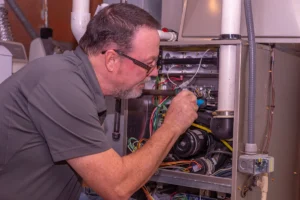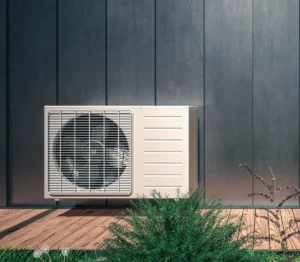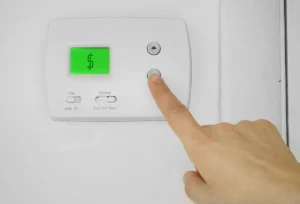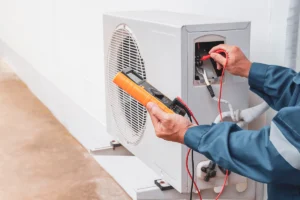People ask us all the time: “what does Freon smell like?” Honestly, it’s a good question—because the first time you notice a weird chemical odor near your air conditioner, it can throw you off. Most folks don’t think about refrigerant until something goes wrong, but that smell can be an early warning sign of a leak.
And here’s the deal: refrigerant isn’t supposed to leak at all. When it does, your system is trying to tell you something.
What Does Freon Smell Like, Really?
To be straight with you, there isn’t one “perfect” description. Some people say it smells kind of sweet, almost like chloroform. Others compare it to paint thinner or even nail polish remover. We’ve had homeowners describe it as a faint chemical odor they couldn’t quite place.
The important part isn’t getting the description exactly right—it’s realizing that any unusual chemical smell near your AC system isn’t normal.
The EPA has resources for homeowners about refrigerants and what to know if they leak.
Why Knowing Matters: What Does Freon Smell Like?
So why does it matter if you know what refrigerant smells like? Simple—catching a leak early can save you from bigger headaches later.
Here’s what happens when refrigerant leaks:
Your AC won’t cool like it used to.
Energy bills creep up because the system works harder.
The compressor can get damaged, which is a costly repair.
In bigger leaks, breathing the fumes could make you feel sick.
We’ve seen customers ignore a faint smell for weeks, only to end up with a dead compressor. That’s not a cheap fix.
Other Clues to Watch For
Sometimes smell alone doesn’t give the whole picture. That’s why you should also keep an eye (and ear) out for these:
Hissing or bubbling sounds near the outdoor unit.
Ice building up on copper lines or the indoor coil.
Weaker airflow or air that doesn’t feel as cool.
Sticky humidity in the house even with the AC running.
The Department of Energy has noted that refrigerant leakage reduces cooling capacity and system efficiency, which can lead to higher energy use and unnecessary wear on equipment.
Is Freon Dangerous to Breathe?
This is another big one we hear after “what does Freon smell like?” In small amounts, you’re not likely to get seriously sick. But in higher concentrations, refrigerant displaces oxygen, which can cause headaches, dizziness, or nausea.
That’s why technicians have to be EPA-certified to handle refrigerants safely (EPA Technician Certification). It’s not something you want to tinker with on your own.
What To Do If You Think You Smell Refrigerant: What Does Freon Smell Like?
Here’s the play-by-play if you think your AC might be leaking:
Turn off your system. Don’t run it and risk further damage.
Air things out. Open a window or two if you can.
Call a pro. Refrigerant leaks need special tools to diagnose and repair.
We always tell customers: topping off refrigerant without finding the leak is like filling a flat tire without patching the hole. It won’t last.
Can Leaks Go Undetected Without Smell?
Absolutely. Some leaks are so small you’d never notice a smell. That’s why techs use tools like electronic detectors and UV dyes to find them. We’ve had calls where everything seemed fine—no smell, no big symptoms—until we ran a test and found a slow leak draining efficiency month after month.
What Does Freon Smell Like Compared to Other HVAC Odors?
This is where things get tricky. Homeowners sometimes confuse refrigerant with other HVAC smells. A few quick comparisons:
Musty smell? Probably mold in the ducts or coil.
Burning smell? Could be electrical or dust burning off.
Rotten eggs? That’s natural gas—not refrigerant—and you need to leave the house and call the gas company immediately.
Knowing what freon smells like helps you rule out the other issues and decide what to do next.
Final Thoughts: What Does Freon Smell Like?
So, what does freon smell like? For most people, it’s a sweet, chemical odor that doesn’t belong in your home. Even if the smell isn’t strong, it’s still a red flag. And while a quick whiff might not harm you, it’s your system’s way of telling you something isn’t right.
At Sub Zero Temp Control, we deal with refrigerant issues all the time. We’ve seen the small leaks that sneak by unnoticed and the big ones that shut systems down in the middle of summer. Either way, the fix is the same—find it, repair it, and recharge the system the right way.
And if you’re local to Vancouver, WA, or one of the nearby areas, we’re here to help. But no matter where you live, the advice stands: don’t ignore the smell. A fast call today can save you money and stress tomorrow. Contact us today to schedule a service—we’re ready to help.
Read Next: External Static Pressure: What It Means for Your HVAC






